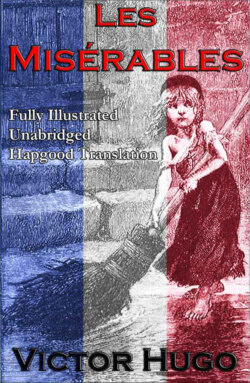Читать книгу Les Miserables (Fully Illustrated Unabridged Hapgood Translation) - Victor Hugo - Страница 11
На сайте Литреса книга снята с продажи.
ОглавлениеHere and there he halted, accosted the little boys and girls, and smiled upon the mothers. He visited the poor so long as he had any money; when he no longer had any, he visited the rich.
As he made his cassocks last a long while, and did not wish to have it noticed, he never went out in the town without his wadded purple cloak. This inconvenienced him somewhat in summer.
On his return, he dined. The dinner resembled his breakfast.
At half-past eight in the evening he supped with his sister, Madame Magloire standing behind them and serving them at table. Nothing could be more frugal than this repast. If, however, the Bishop had one of his cures to supper, Madame Magloire took advantage of the opportunity to serve Monseigneur with some excellent fish from the lake, or with some fine game from the mountains. Every cure furnished the pretext for a good meal: the Bishop did not interfere. With that exception, his ordinary diet consisted only of vegetables boiled in water, and oil soup. Thus it was said in the town, when the Bishop does not indulge in the cheer of a cure, he indulges in the cheer of a trappist.
After supper he conversed for half an hour with Mademoiselle Baptistine and Madame Magloire; then he retired to his own room and set to writing, sometimes on loose sheets, and again on the margin of some folio. He was a man of letters and rather learned. He left behind him five or six very curious manuscripts; among others, a dissertation on this verse in Genesis, In the beginning, the spirit of God floated upon the waters. With this verse he compares three texts: the Arabic verse which says, The winds of God blew; Flavius Josephus who says, A wind from above was precipitated upon the earth; and finally, the Chaldaic paraphrase of Onkelos, which renders it, A wind coming from God blew upon the face of the waters. In another dissertation, he examines the theological works of Hugo, Bishop of Ptolemais, great-grand-uncle to the writer of this book, and establishes the fact, that to this bishop must be attributed the divers little works published during the last century, under the pseudonym of Barleycourt.
Sometimes, in the midst of his reading, no matter what the book might be which he had in his hand, he would suddenly fall into a profound meditation, whence he only emerged to write a few lines on the pages of the volume itself. These lines have often no connection whatever with the book which contains them. We now have under our eyes a note written by him on the margin of a quarto entitled Correspondence of Lord Germain with Generals Clinton, Cornwallis, and the Admirals on the American station. Versailles, Poincot, bookseller; and Paris, Pissot, bookseller, Quai des Augustins.
Here is the note:—
“Oh, you who are!
“Ecclesiastes calls you the All-powerful; the Maccabees call you the Creator; the Epistle to the Ephesians calls you liberty; Baruch calls you Immensity; the Psalms call you Wisdom and Truth; John calls you Light; the Books of Kings call you Lord; Exodus calls you Providence; Leviticus, Sanctity; Esdras, Justice; the creation calls you God; man calls you Father; but Solomon calls you Compassion, and that is the most beautiful of all your names.”
Toward nine o’clock in the evening the two women retired and betook themselves to their chambers on the first floor, leaving him alone until morning on the ground floor.
It is necessary that we should, in this place, give an exact idea of the dwelling of the Bishop of D——
